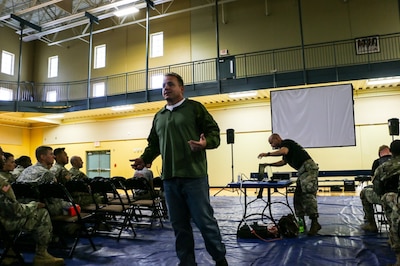By Jim Garamone DoD News, Defense Media Activity
WASHINGTON, Dec. 6, 2017 — Networks are a fact of life in
the world today and they are both the problem and the solution, U.S. Southern
Command’s chief said today at the Caribbean Nations Security Conference in
Georgetown, Guyana.
Navy Adm. Kurt W. Tidd reiterated a theme he broached in
last year’s conference: the idea of networks.
Networks are a fact of life in the 21st century and they
drive the world. “They are a defining characteristic of our daily lives,” the
admiral said. “We rely on them, we're part of them, and we're threatened by
them.”
Transnational Threat Challenges
Whether these are networks of people, nations, communities,
computers, satellites, drug lords, terrorists; they must be dealt with in their
own ways. “Everywhere we look, we see volatility, uncertainty, and
interconnectedness of challenges,” he said.
The days when a threat could be isolated to one area are
over. Today, threats originating in one country will travel the world at the
speed of electrons. “Regional and global risks are materializing in new and
unexpected ways,” Tidd said. “We see both traditional and nontraditional
threats coexisting and reinforcing one another. We see state and nonstate
actors competing for influence and challenging democratic values. And we see
the rising frequency of extreme weather events and their far-reaching impacts
on our people and economies.”
These events and networks must be dealt with using other
networks.
“Our security cooperation has evolved and grown beyond individual
and the bilateral -- beyond even the subregional,” he said. “Our security
cooperation is now a system -- a network -- that binds together the nations of
the Western Hemisphere.”
Tidd noted that multinational organizations like the
Caribbean Community, the Caribbean Disaster Emergency Management Agency, the
Regional Security System and the Inter-American Development Bank are key to
working together in the region. Partners across the Atlantic -- Great Britain,
France, the Netherlands and others -- also bring important resources and
systems to help.
Information Sharing Network
“This network was born of sustained engagements that
emphasize collective action and cooperative solutions,” the admiral said. “It
is built upon the foundation of information sharing. It is inclusive and
principled, binding together like-minded nations who share common values and a
commitment to work together.”
These values bind together the nations of the region and
bind together often disparate efforts so they work together, he said.
“The collective investments we have made are not just
investments in our shared security and prosperity, they are investments in one
another,” Tidd said. “They are investments in the capacities of our civilian,
military, and interagency institutions, investments in our interoperability in
areas like disaster response and countering threat networks, and investments in
improved coordination at the strategic, operational and tactical levels.”
These networks reinforce each other and the payoff is
stronger partnerships, deeper trust and increased unity of effort. “Our
hemisphere is more secure, and our forces more capable, because of them,” the
admiral said. “We know more, share more, and do more, because of close, regular
engagement.”
Challenging Hurricane Season
The 2017 hurricane season tested these networks, the admiral
said. Years of working together to strengthen collective capabilities and
capacities, he said, helped during the unprecedented season of dangerous
storms. “When we were tested by Irma and Maria, our forces rose to the
challenge as one network, unified in action and united in purpose,” Tidd said.
“The regional response effort, led by important organizations like CDEMA,
CARICOM and the RSS, was networked collaboration at its finest -- rapidly assessing
the situation, connecting needs with capabilities, and sharing information with
the broadest group of stakeholders.”
The storms caused major devastation throughout the
Caribbean, but the networks worked and they are continuing to work as the region
recovers and rebuilds from the atmospheric onslaught. “I am confident that this
network will continue to serve us well,” the admiral said.
But what is next?
The nations of the region must work to expand and sustain
the network and find new and innovative ways to employ these networks, Tidd
said. Leaders must foster “even greater cooperation and inclusive integration,
not just within the Caribbean, but trans-regionally,” he added.
“The untapped potential of this network is tremendous.
Greater integration and linkages can have all sorts of cross-cutting effects,”
Tidd said.
The conference continues through tomorrow.








